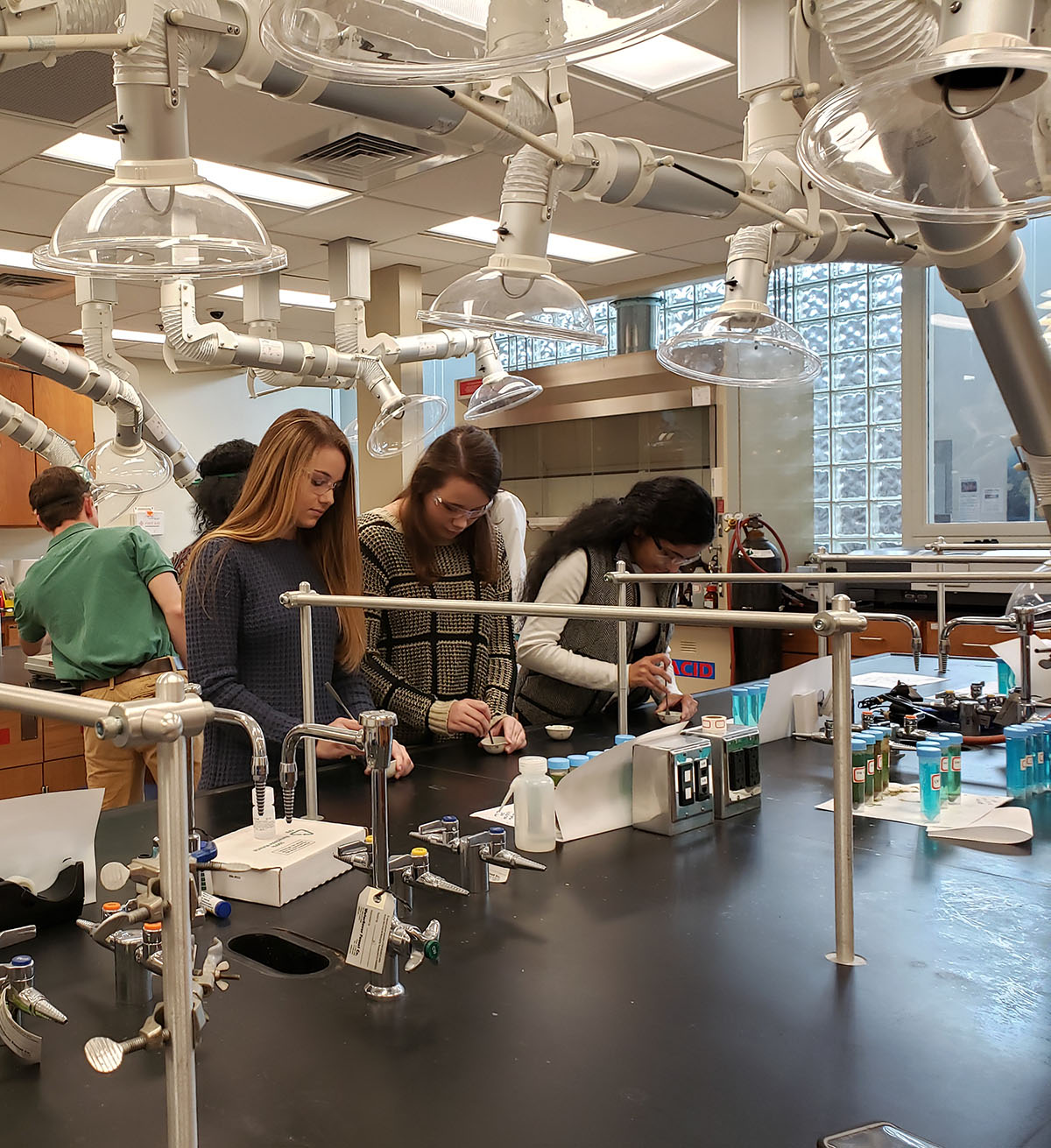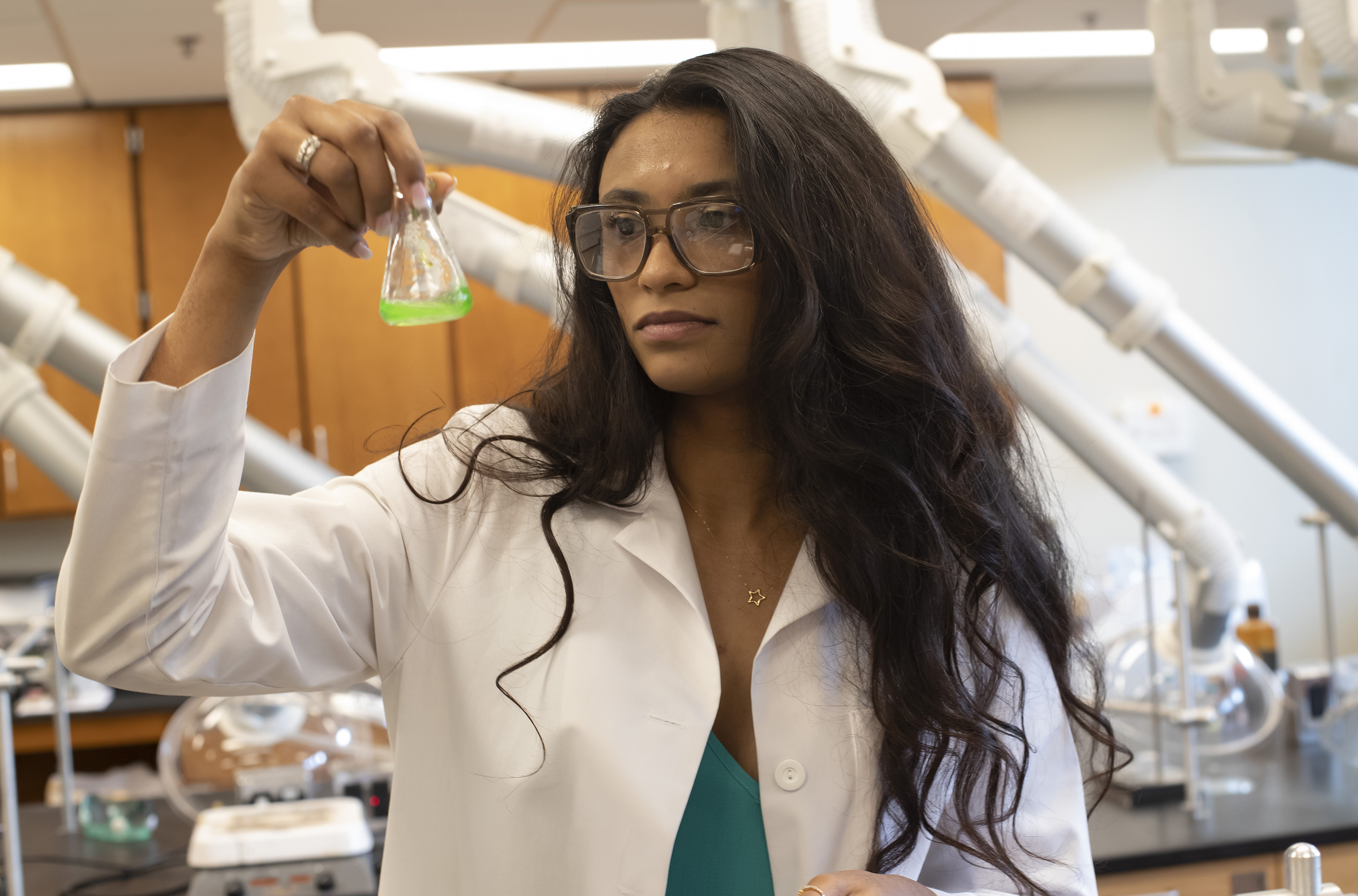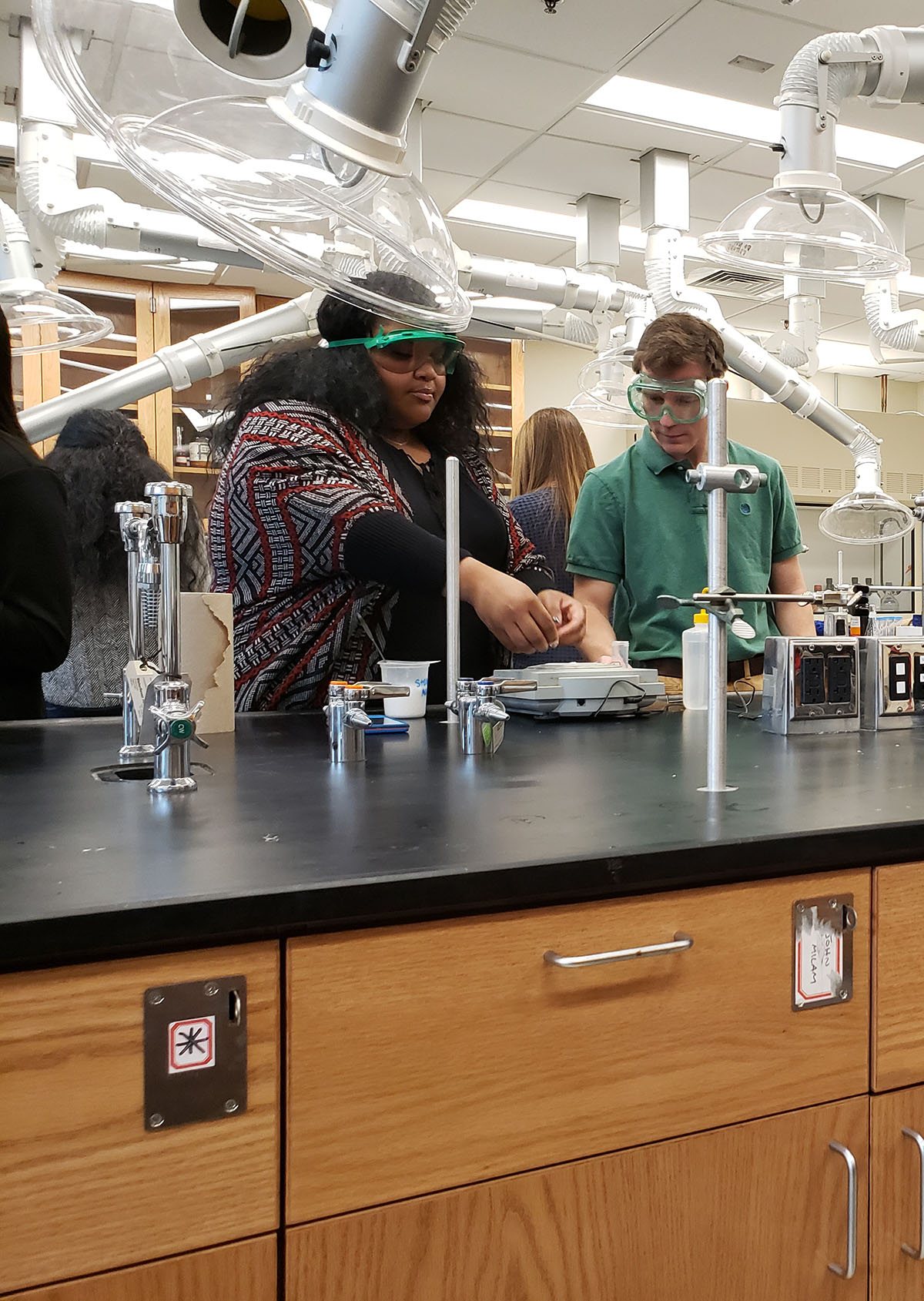September 8, 2020
20-170
Jessica Pope
Communications and Media Relations Coordinator
Making An Impact: Scientific Research Supports VSU’s Efforts to Advance Knowledge, Change Lives

|
|
|
VALDOSTA — At Valdosta State University, faculty-led student research teams work year-round to apply the knowledge and skills learned in the classroom to a wide range of local, regional, national, and global challenges.
This type of experiential learning allows students the opportunity to practice patience and persistence, think critically, expect the unexpected, promote an innovation-oriented culture, and create new knowledge that has the potential to change lives for the better.
With the start of a new semester, VSU’s Communications team checked in with three Blazers who work on research teams with Dr. Tom Manning, a professor in the Department of Chemistry.
Jenu Thomas-Richardson: COVID-19 Research Update
Jenu Thomas-Richardson earned a Bachelor of Science in Biology from VSU in Summer 2019.
Q: What is the purpose of this research?
A: Our motto is “STP: Solve the Problem.” We created a COVID-19 treatment that has shown promise in the reduction of the overall viral load in a person infected with COVID-19. Our humanitarian efforts are to aid national and global communities.
Q: Why is this research important?
A: In these challenging times, the ability to create a treatment for a pandemic affecting our global health community has allowed our team to gain first-hand experience of combining healthcare, politics, and medicine. COVID-19 is a worldwide pandemic that needs an economical, widely available solution and our research has led to such treatment. Our work has culminated in a pending patent and two research publications — “Vaporization, Bioactive Formulations, and a Marine Natural Product: Different Perspectives on Antivirals,” which appeared in Drug Discovery Today and on the World Health Organization webpage, and “Ethanol as a Treatment for COVID-19,” which appeared in the Journal of the Brazilian Medical Association.
Q: What has the research team found so far?
A: We have developed a simple treatment to reduce the viral load in the body. This treatment uses an inhalation delivery method commonly known as “vaping.” Unlike traditional vape juice, our solution is comprised of antiviral components that assist with the reduction of COVID-19 virus loads in the body. There are many studies that correspond and back our findings.
Q: What happens next?
A: Clinical trials are our next step. However, for these clinical trials to occur we need to secure funding. Business propositions, as well as grant applications, have been written over the past month in an effort to gain funding for our trials. If we are successful of obtaining the needed funding, we will be able to continue to find an effective treatment for this worldwide pandemic that has affected numerous populations globally.
Teighlor Livingston: Cancer Research Update
Teighlor Livingston earned a Bachelor of Science in Biology from VSU in Fall 2019 and is currently pursuing a Master of Science in Biomedical Sciences at PCOM South Georgia. She hopes to pursue a career as a medical doctor in rural communities.
Q: What is the purpose of this research?
A: Our research is aimed at “revamping” one of the most common naturally sourced cancer drugs— Paclitaxel (Taxol). The goal is to find a Taxol complex that is optimal for targeted drug delivery against distinct cancer types.
Q: Why is this research important?
A: Efficient drug delivery is vital for proper treatment. Various materials can be added to drugs we know to improve their effectiveness. Improving a cancer drug by adding a drug delivery vehicle increases the bioavailability of the drug and allows for more specific cell targeting.
Q: What has the research team found so far?
A: Many Taxol complexes (i.e. copper-Taxol, iron-Taxol, etc.) have been synthesized and evaluated through testing by the National Cancer Institute against cancer cell lines. Each complex has been tested along with pure Taxol for comparison. One variant of the drug containing copper and Taxol has shown increased efficacy against different cancer types.
Q: What happens next?
A: Development of new Taxol-combination drugs will continue to be explored and tested. Our studies, at the least, bring awareness to issues with cancer treatment that warrant improvement and open the door for those developments to take place for treatment of other conditions.
Courtney Johnson: Tuberculosis Research Update
Courtney Johnson graduated with a Bachelor of Science in Biology from VSU in Fall 2019. She is currently applying to dental school and working as a dental assistant.
Q: What is the purpose of this research?
A: Our research derives from a humanitarian approach as we strive to develop a cost-effective, biodegradable implant to deliver tuberculosis antibiotics. We hope to assist in the eradication of the disease. (VSU researchers have already developed a drug that has been tested extensively at the National Institutes of Health and is proven to effectively treat tuberculosis in living cells.)
Q: Why is this research important?
A: An increase in drug resistance for current tuberculosis antibiotics engenders the necessity of our research. In developing nations, many patients discontinue regimens due to the high cost of treatment and/or the frequent commute to receive medication, which ultimately leads to drug resistance.
Q: What has the research team found so far?
A: Our novel drug has proven to effectively treat tuberculosis in living cells. The chemicals in the drug are cost-effective and the biodegradable implant reduces the number of needed visits for patients. These factors can contribute to the eradication of the disease and drug resistance.
Q: What happens next?
A: The team consistently aims to suppress the diseases humanity faces. Our efforts include a continuation of research, trial and error in the lab setting, and partnering with those who have similar goals in drug development. We are currently working on a book chapter on inhalation therapies used for tuberculosis; it will be published in Integrated Sciences.
Newsroom
- Office of Communications Powell Hall West, Suite 1120
-
Mailing Address
1500 N. Patterson St.
Valdosta, GA 31698 - General VSU Information
- Phone: 229.333.5800
- Office of Communications
- Phone: 229.333.2163
- Phone: 229.333.5983

